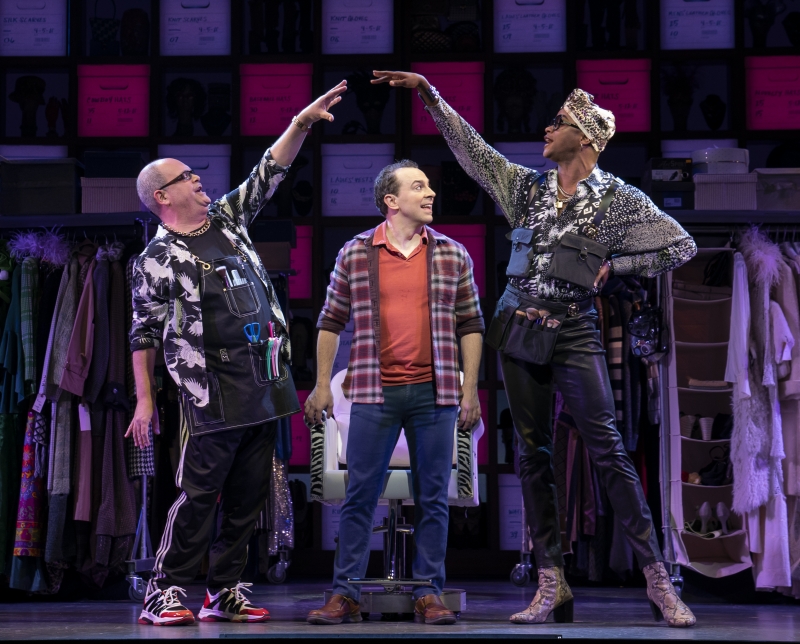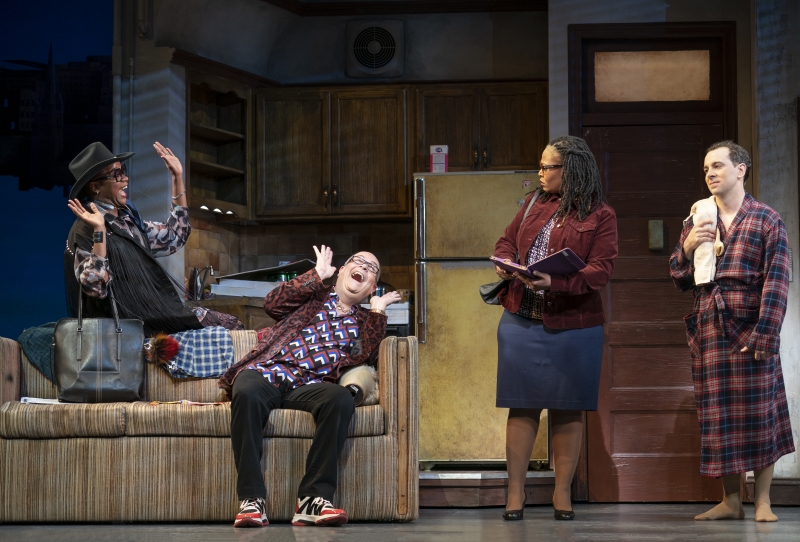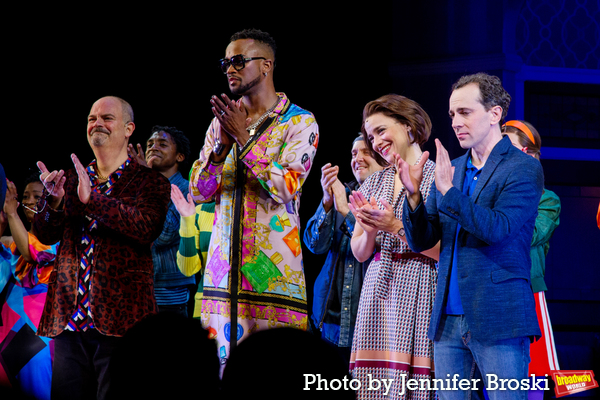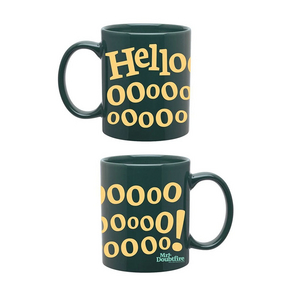Interview: Brad Oscar Shares Details About MRS. DOUBTFIRE's Hiatus
BroadwayWorld spoke with one of the show's stars, Brad Oscar (Frank Hillard) about what led up to the hiatus, what this time looks like for the company, and more.
 Mrs. Doubtfire, the new musical comedy with a book by Karey Kirkpatrick and John O'Farrell and music and lyrics by Wayne Kirkpatrick and Karey Kirkpatrick, directed by Jerry Zaks, is currently taking a hiatus on Broadway from January 10 to March 14, 2022 at the Stephen Sondheim Theatre (124 W 43rd St, NYC).
Mrs. Doubtfire, the new musical comedy with a book by Karey Kirkpatrick and John O'Farrell and music and lyrics by Wayne Kirkpatrick and Karey Kirkpatrick, directed by Jerry Zaks, is currently taking a hiatus on Broadway from January 10 to March 14, 2022 at the Stephen Sondheim Theatre (124 W 43rd St, NYC).
Mrs. Doubtfire officially opened on December 5 at the Stephen Sondheim Theatre, delayed 18 months by the government-mandated shut-down of Broadway.
Audience members currently holding tickets March 15 or later will keep their locations. Anyone with tickets during the hiatus can exchange for a later date or get a complete refund from point of purchase.
Daniel Hillard, a struggling, out-of-work actor, will do anything for his kids. After losing custody in a messy divorce, he creates the kindly alter ego of Scottish nanny Euphegenia Doubtfire in a desperate attempt to stay in their lives. As his new character takes on a life of its own, Mrs. Doubtfire teaches Daniel more than he bargained for about how to be a father. A hysterical and heartfelt story about holding onto your loved ones against all odds, Mrs. Doubtfire is the musical comedy we need right now - one that proves we're better together.
BroadwayWorld spoke with one of the show's stars, Brad Oscar (Frank Hillard) about what led up to the hiatus, what this time looks like for the company, and more.
Let me first ask, this is a tough time, there's a lot going on in the world, how are you doing right now?
I'm doing okay! Showbusiness, it never ceases to unfold in the strangest of ways. It's been such a wild time for all of us in live theater in general, certainly as far as Broadway and the commercial theater goes, literally getting our businesses back up and running. Things were rather copasetic in the fall before things in the beginning of December started to get out of control again. We were really well-positioned. We were doing fine. Box office was great in previews, we had a great advance to get us through these months, which as we know, every January and February is always tricky. So now, what we've done, we've said "Oh, by the way, we really shouldn't be going out," and, who wants to come to New York City?
But the show, we were ready to take on these winter months. We had a good advance, we had groups, we had families. Every Broadway show right now includes a no-hassle return because of what is happening, which is great, people were able to return tickets, groups were able to cancel tickets. Because we're a new show, trying to get our footing, obviously, it was going to be very difficult, and we were going to start to lose a lot of money in these weeks, when you're playing to half-houses, if that.
The way our show is navigating, thanks to Kevin McCollum, and I think his total smarts in trying to give this show the run it deserves, we are able to just go on hold for nine weeks. Which I think is terrific! I think, God willing, this gets under control, the new variant, we get back to a place that we were a couple months ago. I believe our show can get its footing and we can take off, and we can have a great run.
Now, there are many variables, as we know. But we are hoping that this can happen. The alternate is we would close in a week or two. Because we would be losing over a million dollars within another week or so. I think a lot of people don't quite understand this is literally a business. Each show is its own individual corporation and business. You open, and the only way you pay these people, is if people are coming to see it, that's where the money comes from. The dollars and cents of it, as we know, are brutal. I'm optimistic though, that this is going to work for us. I really am.

It sounds smart, if it is possible.
Exactly, if it is possible. But, the realities of our business, and our industry, you're talking about upwards of thirteen or fourteen different unions that come together, and you're talking about real estate, and theater ownership. In the history of Broadway, a show has either been open, or it's been closed. There's been no in between like this, because you're paying rent on the theater, you're paying rent on equipment. But, we are in unprecedented, ridiculous times, and for an industry that is so tenuous to begin with, to keep a show running, as we know, unless it's a big ol' hit, is a difficult thing. And we've got to be willing to find a way to make this work right now for everybody involved. And hopefully this is a way to make it work for Doubtfire.
What were the discussions like within the company, coming to the decision to go on hiatus? What did that look like for the cast and for everyone involved?
We found out about it, we were told, "This is what's happening." And I think a lot of us who have been doing this for a while were fully aware in the weeks leading up to this decision that houses were getting smaller, during the holiday week, which is the biggest week of the year. When we were performing that week and I looked out and saw what was happening to our audiences - and believe me, this was around the neighborhood too, I talked to people in other shows - I was like, "Uh-oh, this doesn't bode well. Because if this is what this house looks like this week? What's it going to look like next week in the middle of January?"
So, most of us, our ears went up, "Uh-oh, we're in trouble." Again, the only world I've ever lived in is, "Well, I think we might close." I'm like, "Oh my God, this might not happen because of Omicron. Literally Covid could kill us." That's what I was thinking. Not because of the reviews, not because of the response. I mean, my God, audiences love this show, I'm very proud of this show. This show deserves to run. We are telling a beautiful story, we are talking about what it means to be a family in ways that are so resonant and relevant today. I really believe in this show, and I am so proud and excited that it will hopefully get the chance it deserves.
When Kevin told us, my initial response was, "Yay! I'll take it! I want my paycheck, and nine weeks without a paycheck is going to suck for everyone in that building, of course. Everyone. Especially after being out of work for so long and finally being back to work. But, would you rather the show close next week? And then you have no job. And then move on." And we'll all move on at some point, that's show biz. And if it happens, you take the badge and you move on, we all get that. But we have an opportunity to make this work, and hopefully have a long run at The Sondheim [Theatre] and continue to be the family that we are. But that's not going to happen unless we are able to, again, get through these weeks and hopefully regain our traction and make it work that way.
What does this time look like for the company? Are you doing Zoom rehearsals? Are you keeping in touch with the cast?
Nine weeks feels like cake as far as that goes, because this is our second time now enduring a shutdown. We had done three previews in March of 2020 before we shut down. So believe me, I'm not worried about our company as far as staying in touch, keeping it going. We won't be rehearsing or anything because we're not under contract, the show closed right now technically. We have no responsibility to the show. And we won't just open on Tuesday, March 15th, we'll be in a room probably the week before getting ourselves back. But nine weeks is not a very long time, muscle memory is amazing. And we're professionals, this is an amazing, extraordinary group of people.
So, we'll do what we do. People will go back to their lives. Everyone will have their own journey. I will probably eat too much, and cook, and get to watch all the football I want. I'm not going to learn a new language or start painting. People will do whatever they need to do to keep going and survive, whatever that means. Maybe try to find some work, because as I said, missing that paycheck sucks. But the good side is all the parents get to be back with their kids, you get to see friends at a normal hour because people do things a lot on weekends when we can't. So, you take advantage of not working, in that way. I don't mean to say it is what it is, but I've been doing this a long time, and being out of work, or having downtime, is part of the deal. So, as much as sometimes it sucks, and sometimes it's more painful than other times, I'm used to it in that way.
You're such an industry pro, you are very realistic, but you've got a good attitude.
All I'm speaking from is just that, a place of having been so lucky to do what I love to do, and do it here in this city, on Broadway, where I grew up coming up to the city and seeing shows. In so many ways I'm still that kid, that thirteen-year-old fan. And so, the older I get, I'm able to say, "Look at me, this is my ninth Broadway show!" It's not lost on me. So, that's what you're hearing, which is great, because I think that grounds me, and keeps my own sanity.
From the minute we opened, we then ran head-on into Omicron. From the minute we came back after opening, we were starting to deal with people being out. And we were starting to deal with putting people on who hadn't been on yet. We had just opened, so you'd only have had so much Understudy rehearsal. And then we had to suspend for ten performances. It was just so upsetting. We were trying to outrun it, we outran it for a couple of days, but we knew we were at our tipping point. We knew that any more people... and not just onstage people, we have wardrobe, we have crew, we have a lot of people back there. And then we came back and continued to juggle. And then Rob McClure went down. So then we were dealing with putting on KJ Hippensteel, his Understudy. And again, this is what we do!
But we didn't miss a beat. And that show, once we reopened, every night got the same standing ovation. The mix and match that we were doing, things the audience should never know is going on, professionals come together, and that's why it's Broadway. Never more so was I aware of that, and proud to be a professional actor on Broadway, and part of this company specifically. I can't say enough about people who came together to do that.
Like we all say, we are living in unprecedented times, we're going through so much. What would you say that you've learned about yourself as a performer and a person during not just this time, but the last two years?
Certainly over the big break, knowing that this part of my profession has sort of dried up at the moment, it was very interesting, fascinating, and scary to evaluate and examine, "Am I what I do? How much of what I do is who I am?' For most of us, our profession is part of who we are, for better or for worse, right? It defines our lives in many ways. My profession also involves a level of connection to self, to being, to ego in the pure sense, who I am in that big way. It's connected in a way that is so deep and feeds my soul, keeps me going, it's what I love to do. So, having it taken away was, yes, horrible. I will always I feel like from here forward, even more so, I'll embrace, enjoy, and try to really let each experience be the fullest that it can be. Because it is special, and it can be taken away.

With all of that being said, what are you most looking forward to when Mrs. Doubtfire does return to Broadway?
I'm looking forward to just the little things. I'm looking forward to getting back to work, and my paycheck, that's a given. I'm going to miss the day in-day out, the minutia. Saying, "How was your day? What's going on?" Chatting about this, gossiping about that. We do it eight times a week, and so, in many ways we're doing "the same thing", but every day is its own, every day is its own audience, every day we all come to the theater with our own day behind us, so every night is different. That's just part of the joy of what we do. No matter what's going on, 120 people, from the front of house, box office, everyone backstage, we all come together at 8 o'clock to make Mrs. Doubtfire happen for two and a half hours. The magic of that, I love. We're all going to tell one story. And we're going to share that every night. And if I'm exhausted, and I'm dragging my ass up and down the steps, it doesn't matter. I'm going to get out on that stage, and I promise you, I'm going to be totally present, giving my all to do my part.
Broadway needs this show right now. Broadway is a whole spectrum of different kinds of entertainment, and that's exactly how it should be, but there is nothing like Mrs. Doubtfire on Broadway right now I don't think. Especially as far as families and kids. There is nothing better than the sound of a child's laugh in the theater! And the idea that we could be changing someone's life that night. We could be guiding someone into a life in the theatre, or a life going to the theatre.
Helmed by four time-Tony Award winning director Jerry Zaks (Hello, Dolly!), the new musical comedy features a book by Karey Kirkpatrick and John O'Farrell and music and lyrics by Wayne Kirkpatrick and Karey Kirkpatrick, the Tony Award nominated team behind Something Rotten! The creative is rounded out by choreographer Lorin Latarro (Waitress); Music Supervisor, Arranger and Orchestrator Ethan Popp (Tina); Scenic Designer David Korins (Hamilton); Costume Designer Catherine Zuber (Moulin Rouge! The Musical); Lighting Designer, Philip S. Rosenberg (Pretty Woman); Sound Designer Brian Ronan (Mean Girls); Hair & Wig Designer David Brian Brown (Moulin Rouge! The Musical); and Make-up Designer Tommy Kurzman (All My Sons).


 Mrs.Doubtfire Hello Mug
Mrs.Doubtfire Hello Mug